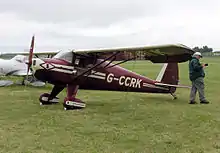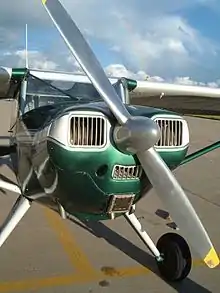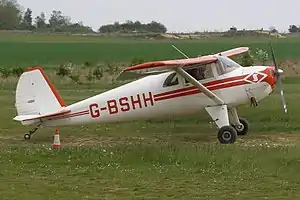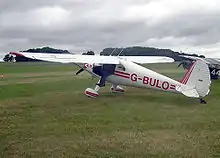Luscombe 8
The Luscombe 8 is a series of high-wing, side-by-side-seating monoplanes with conventional landing gear, designed in 1937 and built by Luscombe Aircraft.


| Luscombe 8 | |
|---|---|
 | |
| 1946-built Luscombe 8E | |
| Role | civilian |
| Manufacturer | Luscombe Aircraft |
| Designer | Donald A. Luscombe |
| First flight | December 17, 1937 |
| Produced | 1937 – c. 1940s |
| Number built | 5,867 (1960)[1] |
Development
Luscombe Aircraft closed in 1949, with its assets purchased by Temco Aircraft, also Dallas-based.[2] Temco built about 50 Silvaires before selling the rights to the Silvaire Aircraft Corporation in 1955.[3]
When TEMCO chose to discontinue production, the Luscombe tooling, parts and other assets were purchased by Otis Massey. Massey had been a Luscombe dealer since the 1930s. His new venture opened in Fort Collins, Colorado, as Silvaire Aircraft and Uranium Corp. From 1956 to 1961, this firm produced 80 aircraft. The make and model for all 80 was Silvaire 8-F, with "Luscombe" shown in quotation marks in company literature. Only one aircraft, N9900C, serial number S-1, was built in 1956. N9900C first flew on September 10, 1956 and was sold, according to the FAA aircraft database, to a dealer, Boggs Flying Brokers, in California the following spring. Six aircraft were built in 1957 (serial numbers S-2 through S7). Serial numbers S-2 and S-3 were shipped via C-46 aircraft to Buenos Aires, Argentina. The first aircraft was constructed from spares or MRB parts that were serviceable, but remaining from TEMCO's prior production. TEMCO supplied enough inventory for the completion of approximately four aircraft.[4]
Famous owners
James May of BBC's Top Gear wrote in Top Gear Magazine in 2007 about his 1946 model Luscombe 8A ownership experience. After a temporary loss of power in flight of the meticulously maintained aircraft he concluded in a tongue-in-cheek manner, "All this old stuff is rubbish. None of it works properly. After almost a whole day of fart-arsing around with machinery, I was forced to conclude that the only dependable things in my life are an Italian car and a British motorcycle."[5]
Variants
- Model 8
- Initial variant with a 50 hp (37 kW) Continental A-50 engine.

- Model 8A Luscombe Master
- Model 8 with a higher power 65 hp (48 kW) Continental A-65 engine.
- UC-90A
- One Model 8A adopted by the United States Army Air Forces during World War II (s/n 42-79549).
- Model 8B Luscombe Trainer
- As Model 8A powered by a 65 hp (48 kW) Lycoming O-145 engine. One impressed by the United States Army Air Forces during World War II as UC-90 (s/n 42-79550).
- Model 8C Silvaire Deluxe
- As Model 8A powered by a 75 hp (56 kW) Continental A-75 engine.
- Model 8D Silvaire Deluxe Trainer
- As Model 8A with steerable tailwheel and other minor changes.
- Model 8E Silvaire Deluxe
- An improved Model 8C with increased gross weight and powered by an 85 hp (63 kW) Continental C-85 engine.
- Model 8F
- High-performance variant with a 90 hp (67 kW) Continental C-90 engine.
- Model T8F Luscombe Observer
- A tandem two-seat variant of the 8F for observation duties.
- Model 8G
- Was a proposed variant of the 8F with a tricycle landing gear, not built.
- Luscombe LSA-8
- Model for the US light-sport aircraft category, produced by the Luscombe Silvaire Company of Riverside, California and introduced at Sun 'n Fun 2007. The LSA-8 is powered by a Continental O-200 engine of 100 hp (75 kW). The design is a Federal Aviation Administration accepted special light-sport aircraft.[6][7][8][9]
- Dair 100 testbed
- One Luscombe 8A was equipped with a Dair 100 two-stroke diesel engine as a testbed aircraft.[10]
Specifications (Silvaire 8-F)

Data from Jane's All The World's Aircraft 1961–62[3]
General characteristics
- Crew: one
- Capacity: one passenger
- Length: 20 ft 0 in (6.10 m)
- Wingspan: 35 ft 0 in (10.67 m)
- Height: 6 ft 3 in (1.91 m)
- Wing area: 140 sq ft (13 m2)
- Empty weight: 870 lb (395 kg)
- Gross weight: 1,400 lb (635 kg)
- Fuel capacity: 25 US Gallons (95 L)
- Powerplant: 1 × Continental C90 air-cooled flat four, 90 hp (67 kW)
- Propellers: 2-bladed metal fixed pitch, 5 ft 11 in (1.80 m) diameter
Performance
- Maximum speed: 128 mph (206 km/h, 111 kn)
- Cruise speed: 120 mph (190 km/h, 100 kn)
- Stall speed: 40 mph (64 km/h, 35 kn) (flaps down)
- Range: 500 mi (800 km, 430 nmi)
- Service ceiling: 17,000 ft (5,200 m)
- Rate of climb: 900 ft/min (4.6 m/s)
Sub-Model T8F has tandem seating but is generally similar in dimension, Sprayer version approved for Restricted category operations can have higher Gross Weight with operational limits.
See also
Aircraft of comparable role, configuration, and era
- Aeronca Champ
- ERCO Ercoupe
- Piper Cub
- Taylorcraft B
References
- Jackson 2003, p. 705.
- Gunston 2005, p. 294.
- Taylor 1961, p. 321.
- Swick, John C. (2005). Luscombe's Golden Age (1st ed.). Brawley, California: Wind Canyon Books. ISBN 1-891118-51-X.
- "James May's bad air day - BBC Top Gear". Topgear.com. Retrieved 2012-07-30.
- Bayerl, Robby; Martin Berkemeier; et al: World Directory of Leisure Aviation 2011-12, page 64. WDLA UK, Lancaster UK, 2011. ISSN 1368-485X
- Experimental Aircraft Association (2012). "EAA's Listing of Special Light-Sport Aircraft". Archived from the original on 28 February 2014. Retrieved 1 June 2012.
- Tacke, Willi; Marino Boric; et al: World Directory of Light Aviation 2015-16, page 67. Flying Pages Europe SARL, 2015. ISSN 1368-485X
- Federal Aviation Administration (26 September 2016). "SLSA Make/Model Directory". Retrieved 6 March 2017.
- Diesel Air. "Various Pictures". www.dair.co.uk. Retrieved 15 March 2018.
- Gunston, Bill (2005). World Encyclopedia of Aircraft Manufacturers (Second ed.). Stroud, UK: Sutton Publishing. ISBN 0-7509-3981-8.
- Jackson, Paul (2003). Jane's All The World's Aircraft 2003–2004. Coulsdon, UK: Jane's Information Group. ISBN 0-7106-2537-5.
- Swick, John C. (1992). The Luscombe Story (3rd ed.). Terre Haute, Indiana: SunShine House. ISBN 0-943691-00-1.
- Taylor, John W. R. (1961). Jane's All The World's Aircraft 1961–62. London: Sampson Low, Marston & Company.
- Thomas, Stanley G. (1991). The Luscombes (1st ed.). Blue Ridge Summit, Pennsylvania: Tab/Aero Books. ISBN 0-8306-3618-8.
- Zazas, James B. (1993). Visions of Luscombe - The Early Years (1st ed.). Terre Haute, Indiana: SunShine House. ISBN 0-943691-09-5.